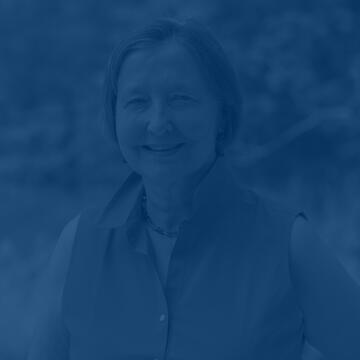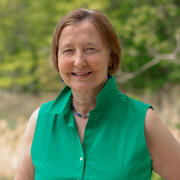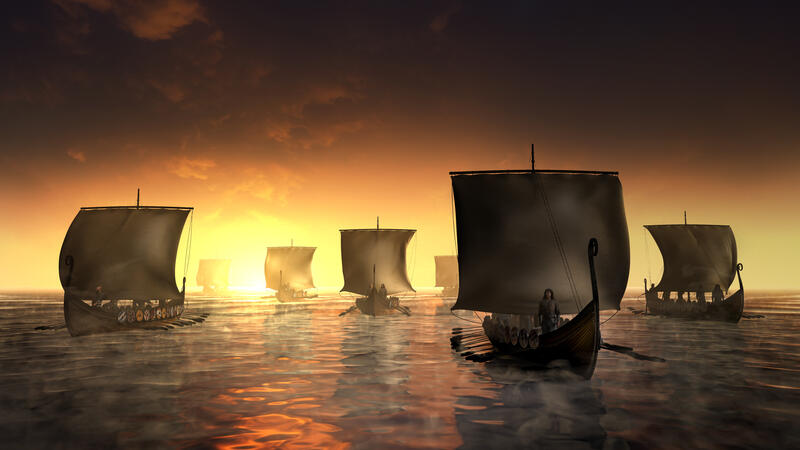The Year 1000: When Explorers Connected the World—and Globalization Began
People often think that the years immediately prior to AD 1000 were, with just a few exceptions, lacking in any major cultural developments or encounters, that Europeans hadn’t yet reached North America, and that the farthest feat of sea travel was the Vikings’ invasion of Britain. But how, then, to explain the presence of blond-haired people in Maya temple murals at Chichén Itzá, Mexico? Is it possible that the Vikings had found their way to the Americas during the height of the Maya empire?
In fact, the year 1000 was the world’s first point of major cultural exchange and exploration. We begin our journey with the Vikings who crossed from Scandinavia to Iceland, Greenland, and finally landed in Canada just around that time (and we’ll talk about the possibility that they reached the Yucatan Peninsula as well). We travel with a second group of Norse, the Rus, who traveled across Eastern Europe and introduced Christianity to today’s Ukraine. At this time, Islam spread into Central Asia and Africa, just as Buddhism and Hinduism moved into Southeast Asia. We conclude with the most globalized place on earth: Song-dynasty China and its trade partners in Japan, Korea, and Southeast Asia. Throughout the class, we’ll be debating whether globalization is the right term for the changes taking place around 1000.
Each week we’ll read one or two chapters from my new book, The Year 1000: When Explorers Connected the World—and Globalization Began. In class we’ll discuss key passages from different primary sources in translation that I’ll distribute each week (usually around 20 pages). In addition, I’ll talk briefly about various works of fiction, some written around the year 1000, others examples of well-researched historical fiction. I don’t expect you to read them before that week’s class—unless you’re inspired to jump in—but I hope that you might decide to read them after the course ends.
Information Links


- About the Professor
Valerie Hansen teaches Chinese and world history. Particularly interested in the history of the Silk Road, she is the author of The Silk Road: A New History with Documents, published in 2016 (an expanded version of her 2012 book). Her most recent book, entitled The World in the Year 1000: When Globalization Began (published in April 2020), explores what happened when the different peoples around the world realized for the first time that they had neighbors and had to decide how to react. Specifically, it examines the people and goods that traveled from one region of the world to another in the five centuries before Columbus. She travels to East Asia frequently, teaching at Yale's joint undergraduate program with Peking University in both 2008-09 and 2011-12, at Yale-NUS in Singapore in fall 2015, and at Xiamen University in Fujian, China, in fall 2016.
Week 1:
The Norse in North America
Assigned Readings: Chapters 2 and 3 of The Year 1000;
Primary source readings: The Vinland Sagas; (if you have time, read the two sagas and note the key differences. The introduction is less important but still valuable).
Optional fiction: Beowulf (Sean Heaney translation), Paul Kingsworth, The Wake
Week 2:
The Norse in Eastern Europe and the Spread of World Religions
Assigned Readings: Chapter 4 of The Year 1000;
Primary source readings: PDF available on course page, "Year 1000 Week 2 Russian Primary Chronicle".
Optional fiction: A. B. Yehosha, Journey to the End of the Millennium
Week 3:
The Islamic World
Assigned Readings: Chapter 5 of The Year 1000;
Primary source readings: PDF available on course page, "Year 1000 Week 3 Al-Bakri reading".
Optional fiction: Shahnameh (Dick Davis translation); Amin Maalouf, Samarkand
Week 4:
Voyages in the Indian and Pacific Oceans
Assigned Readings: Chapter 6 of The Year 1000;
Primary source readings: Steve Thomas, The Last Navigator
Optional fiction: Dennis Washburn (trans.) The Tale of Genji
Week 5:
Song-dynasty China and Its Trade Partners in Japan, Korea, and Southeast Asia
Assigned Readings: Chapters 7 and 8 of The Year 1000;
Primary source readings: Chau Ju-kua (now spelled Zhao Rugua), On the Chinese and Arab Trade in the Twelfth and Thirteenth Centuries: entry #23 Mecca, #24 Zanguebar (Zanzibar), #25 Berbera Coast, #26 Sohar, #27 Somali Coast pp. 124-132. The book is available online via this link.
Artwork: The Qingming Scroll (Video). If you have time, please watch.
Required Reading(s):
The Year 1000: When Explorers Connected the World -- and Globalization Began - $20.49 - Amazon.com
The Vinland Sagas (Penguin Classics) - $13.18 - Amazon.com
The Last Navigator: A Young Man, an Ancient Mariner, the Secrets of the Sea - $18.99 - Amazon.com

October 7, 2020
3:30 - 5 p.m. eastern
Faculty: Valerie Hansen
Terms & Conditions
Info Accordions
Yale Alumni Academy’s Virtual Seminars meet weekly on Zoom for five, 90-minute sessions. Enrollment is limited to 20 participants. This small group format thrives on a sense of intellectual collegiality, including sharing our backgrounds and the curiosities that we bring to this course. Online courses are primarily synchronous, with live sessions focused on discussion and interactive exchange amongst faculty and fellow participants.
Outside readings and other multi-media course materials enhance the learning experience and can be accessed via the private course website hosted on Yale’s Canvas learning platform. Participants will receive a training on the online tools, and technical support will be available throughout the program. To join the course, you will need a computer or tablet with a video camera and a high-speed internet connection.
Alumni and friends of Yale are welcome to register for this course on a space-available, first-come, first-served basis. Once all available course slots have been filled, new registrants will be notified by email of their status on the waiting list.
No-risk cancellation is available through Wednesday, September 16th after which time, there will be no refunds issued. If Yale Alumni Academy cancels any course prior to its start, you may sign up for another course or your fee will be fully refunded.
Please be sure to complete all pages of the informational form. You MUST choose the registration fee at the bottom of the Registration Page to properly complete registration. Then be sure to click the final "Click to Complete Registration" button. Your reservation has not been received by the YAA until you complete payment information on final screen. Please double check that the name of your course is correct before confirming registration. You will receive a summary email immediately after you complete your registration.
Each registration covers one person. If your spouse or family member would like to join the course, please select "Add a Guest" at the bottom of the main registration page. Please ensure you check the course name for each guest as well. You will be billed for the additional registration. If you have any questions, please contact Sharon.small@yale.edu.
By registering for, attending or participating in this event, I grant my permission to the Yale Alumni Association (YAA) and/or Yale University to photograph, videotape, and/or audio record my image and/or voice(and that of any minor guest attendees(s)) and the right to to use and reproduce such as images and/or recordings in all media, including digital media, for purpose of promoting Yale University and the YAA programs and events, other purposes in accordance with Yale's mission. I understand that I will have no approval rights with respect to use of these images.